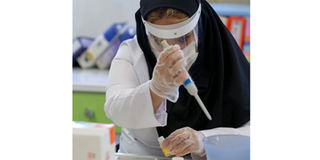The treatment behind coronavirus recovery

Testing. An Iranian health staff works on the production of Covid-19 test kits at a medical centre in Karaj at the northern Alborz Province on Saturday. Photo by AFP
The world is now desperate to find vaccines and cure for coronavirus, which is probably the most terrifying and contagious deadly pandemic that has devastated the entire world in the last millennium.
On Saturday, the Minister of Health, Dr Ruth Jane Aceng, declared 18 former coronavirus patients, out of 53 infected cases, free of the virus following their full recovery.
Dr Aceng told Daily Monitor that the recovered patients have been on hydroxychloroquine, Azithromycin, Vitamin C and rehydration as guided by scientists.
“These people have been on hydroxychloroquine, Azithromycin, Vitamin C and rehydration. We have not given them intravenous rehydration because all of them are able to swallow orally and we have also been following them up with laboratory tests as guided by health workers,” she said.
Dr Aceng said the use of antiretroviral has not yet been used since it is still under trials and scienctists have not yet guided on it.
According to World Health Organisation (WHO), several randomised trials are planned to assess the safety and efficacy of using antiretroviral drugs – mainly LPV/r – for treating Covid-19, in combination with other drugs. Results are expected from mid-2020 onwards.
According to Dr Aceng, the recovered cases will be followed up for 14 days in self-isolation.
“We are guided by scientists that we double check. That is why we do two tests 24 hours apart when they leave here, they go into another self-isolation for 14 days but we are sure they are not having the virus any more in them,” Dr Aceng said.
Health workers at Entebbe hospital said psychosocial support to Covid- 19 patients is very vital.
A cumulative of 5,025 samples have been tested for Covid-19 with a total of 244 individuals under institutional quarantine and 654 contacts to confirmed cases are under follow up.


